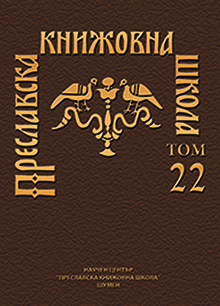„ЗАКОН ЗА СЪДЕНЕ НА ЛЮДЕТЕ“ В НОВОБЪЛГАРСКИ ПРЕВОДИ: МЕЖДУ ТРАНСЛАТОРИКАТА И АКСИОЛОГИЯТА
“LAW FOR JUDGING THE PEOPLE” IN MODERN BULGARIAN TRANSLATIONS: BETWEEN TRANSLATION PRACTICE AND AXIOLOGY
Author(s): Mariyana Tsibranska-KostovaSubject(s): Language studies, Language and Literature Studies, Theoretical Linguistics, Historical Linguistics, Philology
Published by: Шуменски университет »Епископ Константин Преславски«
Keywords: Law for Judging the Peoples, translations from Church Slavonic into Modern Bulgarian
Summary/Abstract: The author deals with the peculiarities of the first new Bulgarian translations of the Law for Judging the People (known as well as Court Law for the People) – an Old Slavonic (Old Bulgarian) legal compilation based on the title 17. of the Byzantine Ecloga with penal character. It is supposed to have appeared in the dawn of the Slavic literacy and the juridical tradition among Slavs (9th century). The main goal is to reveal the way of its penetration in the Bulgarian scholarly space. Study is based on the belief that translation is a complex cultural phenomenon; it meets components of the language source and the language target, sometimes by intermediary of relay translation; each legal concept forms a database of relevant linguistic unities, which can be traced in diachrony both from the point of view of the nomination and in the perspective of the legal content; every translation satisfies socio-historical needs and expresses values and attitudes. Law for judging the people became the object of scholarly interest immediately after the Liberation, when the foundations of the modern legal knowledge and its social organization were laid. In search of identity, the eyes turn to the past – to the Bulgarian customary law and the Christian written heritage. The author focalizes on the following translations: the first one of Petar Odzhakov from 1892; the second of Georgi Danailov from 1901; the third of Stefan Bobchev from1903, and Venelin Ganev’s from 1959, the latter considered to be the official research of highest international recognition. In addition to the general characteristics, discussed are specific examples of translation solutions in a broad comparative plan with the modern critical editions of the Short, the Extensive and the Synodal redaction of the Law for Judging the People; the Dictionary of the monument, made by Kr. Ilievska; the achievements of the contemporary Byzantine studies, law and philology.
Journal: Преславска книжовна школа
- Issue Year: 2022
- Issue No: 22
- Page Range: 245-257
- Page Count: 13
- Language: Bulgarian

